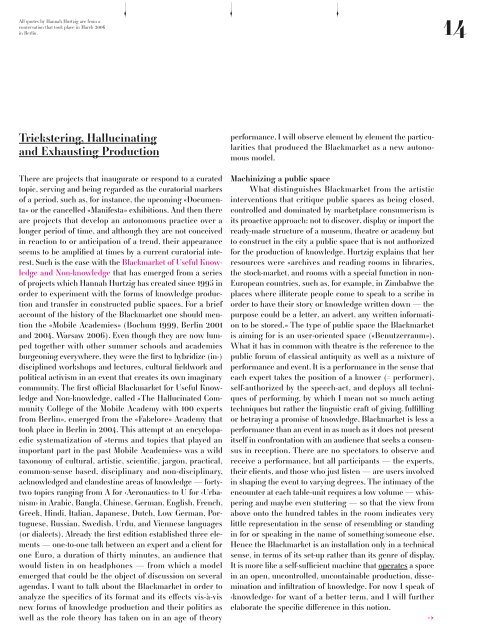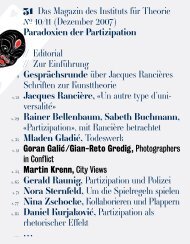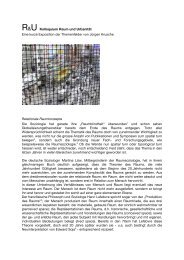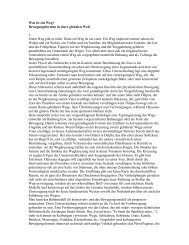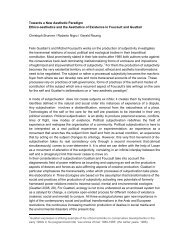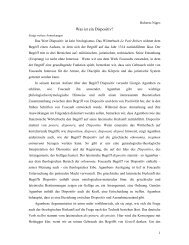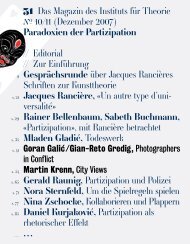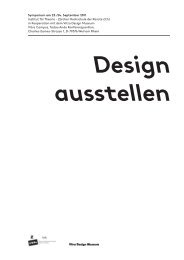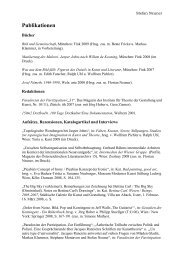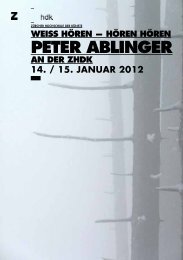PDF des gesamten Heftes (5MB) - Institut für Theorie ith
PDF des gesamten Heftes (5MB) - Institut für Theorie ith
PDF des gesamten Heftes (5MB) - Institut für Theorie ith
Sie wollen auch ein ePaper? Erhöhen Sie die Reichweite Ihrer Titel.
YUMPU macht aus Druck-PDFs automatisch weboptimierte ePaper, die Google liebt.
All quotes by Hannah Hurtzig are from a<br />
conversation that took place in March 2006<br />
in Berlin.<br />
_–<br />
_–<br />
_–<br />
14<br />
Trickstering, Hallucinating<br />
and Exhausting Production<br />
There are projects that inaugurate or respond to a curated<br />
topic, serving and being regarded as the curatorial markers<br />
of a period, such as, for instance, the upcoming «Documenta»<br />
or the cancelled «Manifesta» exhibitions. And then there<br />
are projects that develop an autonomous practice over a<br />
longer period of time, and although they are not conceived<br />
in reaction to or anticipation of a trend, their appearance<br />
seems to be amplified at times by a current curatorial interest.<br />
Such is the case w<strong>ith</strong> the Blackmarket of Useful Knowledge<br />
and Non-knowledge that has emerged from a series<br />
of projects which Hannah Hurtzig has created since 1995 in<br />
order to experiment w<strong>ith</strong> the forms of knowledge production<br />
and transfer in constructed public spaces. For a brief<br />
account of the history of the Blackmarket one should mention<br />
the «Mobile Academies» (Bochum 1999, Berlin 2001<br />
and 2004, Warsaw 2006). Even though they are now lumped<br />
together w<strong>ith</strong> other summer schools and academies<br />
burgeoning everywhere, they were the first to hybridize (in-)<br />
disciplined workshops and lectures, cultural fieldwork and<br />
political activism in an event that creates its own imaginary<br />
community. The first official Blackmarket for Useful Knowledge<br />
and Non-knowledge, called «The Hallucinated Community<br />
College of the Mobile Academy w<strong>ith</strong> 100 experts<br />
from Berlin», emerged from the «Fakelore» Academy that<br />
took place in Berlin in 2004. This attempt at an encyclopaedic<br />
systematization of «terms and topics that played an<br />
important part in the past Mobile Academies» was a wild<br />
taxonomy of cultural, artistic, scientific, jargon, practical,<br />
common-sense based, disciplinary and non-disciplinary,<br />
acknowledged and clan<strong>des</strong>tine areas of knowledge — fortytwo<br />
topics ranging from A for ‹Aeronautics› to U for ‹Urbanism›<br />
in Arabic, Bangla, Chinese, German, English, French,<br />
Greek, Hindi, Italian, Japanese, Dutch, Low German, Portuguese,<br />
Russian, Swedish, Urdu, and Viennese languages<br />
(or dialects). Already the first edition established three elements<br />
— one-to-one talk between an expert and a client for<br />
one Euro, a duration of thirty minutes, an audience that<br />
would listen in on headphones — from which a model<br />
emerged that could be the object of discussion on several<br />
agendas. I want to talk about the Blackmarket in order to<br />
analyze the specifics of its format and its effects vis-à-vis<br />
new forms of knowledge production and their politics as<br />
well as the role theory has taken on in an age of theory<br />
performance. I will observe element by element the particularities<br />
that produced the Blackmarket as a new autonomous<br />
model.<br />
Machinizing a public space<br />
What distinguishes Blackmarket from the artistic<br />
interventions that critique public spaces as being closed,<br />
controlled and dominated by marketplace consumerism is<br />
its proactive approach: not to discover, display or import the<br />
ready-made structure of a museum, theatre or academy but<br />
to construct in the city a public space that is not authorized<br />
for the production of knowledge. Hurtzig explains that her<br />
resources were «archives and reading rooms in libraries,<br />
the stock-market, and rooms w<strong>ith</strong> a special function in non-<br />
European countries, such as, for example, in Zimbabwe the<br />
places where illiterate people come to speak to a scribe in<br />
order to have their story or knowledge written down — the<br />
purpose could be a letter, an advert, any written information<br />
to be stored.» The type of public space the Blackmarket<br />
is aiming for is an user-oriented space («Benutzerraum»).<br />
What it has in common w<strong>ith</strong> theatre is the reference to the<br />
public forum of classical antiquity as well as a mixture of<br />
performance and event. It is a performance in the sense that<br />
each expert takes the position of a knower (= performer),<br />
self-authorized by the speech-act, and deploys all techniques<br />
of performing, by which I mean not so much acting<br />
techniques but rather the linguistic craft of giving, fulfilling<br />
or betraying a promise of knowledge. Blackmarket is less a<br />
performance than an event in as much as it does not present<br />
itself in confrontation w<strong>ith</strong> an audience that seeks a consensus<br />
in reception. There are no spectators to observe and<br />
receive a performance, but all participants — the experts,<br />
their clients, and those who just listen — are users involved<br />
in shaping the event to varying degrees. The intimacy of the<br />
encounter at each table-unit requires a low volume — whispering<br />
and maybe even stuttering — so that the view from<br />
above onto the hundred tables in the room indicates very<br />
little representation in the sense of resembling or standing<br />
in for or speaking in the name of something/someone else.<br />
Hence the Blackmarket is an installation only in a technical<br />
sense, in terms of its set-up rather than its genre of display.<br />
It is more like a self-sufficient machine that operates a space<br />
in an open, uncontrolled, uncontainable production, dissemination<br />
and infiltration of knowledge. For now I speak of<br />
‹knowledge› for want of a better term, and I will further<br />
elaborate the specific difference in this notion.<br />
)


